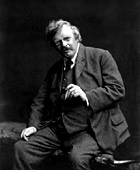Gilbert Keith Chesterton was born on May 29, 1874, in London and died June 14, 1936, in Beaconsfield, a suburb of London in Buckinghamshire. Chesterton was schooled at St. Paul's. He went on to study art at the Slade School and while there attended literature courses at University College. He did not take a degree.
After leaving the Slade, Chesterton worked at low-level jobs in publishing before finding regular work as a freelance journalist, principally with The Bookman as an art critic and The Speaker, as a literary critic. He gained some notoriety at this time through his association with a group of writers who were opposed to the Boer War, a military excursion in South Africa that was popular with the British public. In June 18, 1901, he married his fiancé and one true love, Frances Blogg. In 1902 he was given a regular weekly column of opinion in London's Daily News, and his journalistic career was solidified when, in 1905, he was invited to contribute a weekly column to The Illustrated London News, a column he continued to write for the next thirty years.
When Chesterton's brother Cecil enlisted in 1916, Gilbert took over Cecil's weekly paper, The New Witness. Cecil died in France, and in 1925 Gilbert reorganized the publication as G.K.'s Weekly, which he continued to edit until his death. The newspaper was dedicated to promoting the cause of "Distributism," an economic system based on the social encyclicals of the popes, especially Leo XIII's Rerum Novarum.
Although he considered himself merely a "jolly journalist," the breadth and depth of Chesterton's thought was astonishing, and it's relevance for today is nothing short of uncanny. He was at once a poet, novelist, playwright, short-story writer, and master of the occasional essay, while his non-fiction essays and books made his reputation as a literary critic, a serious commentator on religion, a biographer, a travel writer, and a political radical. In his day, he was also admired as a lecturer and debater, an illustrator, and a popular BBC radio personality. He was remembered by his associates for his engaging personality, his immense girth, and his fabled absentmindedness. In 1922, at the age of forty-eight, after many years of explaining and defending Catholicism, Chesterton was himself received into the Roman Catholic Church.
It has been said of his non-fiction that it is of three kinds. First, as a radical democrat, Chesterton attacked both Socialism and Capitalism, while defending the free and independent family. His definitive work in this area was What's Wrong with the World (1910). Second, Chesterton was and still is revered as a literary critic. His Charles Dickens (1906) is a superlative example of this phase of his work. Third, Chesterton mounted a brilliant and original defense of Christian orthodoxy and traditional morality in such works as Orthodoxy (1909) and The Everlasting Man (1925). This three-fold division is somewhat misleading inasmuch a Chesterton's thought was of a piece, and in the torrent of his essays and books he did not separate religion from literature or politics, but discussed them as part of one integral worldview.
That worldview was first of all a reaffirmation of the philosophical ideas of Thomas Aquinas, that the most radical feature of the universe is that it exists, that existence must have a cause, and that we owe our allegiance to its Creator. From that platform of wonder and praise, Chesterton built his ideas of morals, aesthetics, politics, and religion. He did not claim to have invented an original system of thought, but to be the defender of obvious common sense and the traditions of humanity.
The quality of Chesterton's mind was unique. His general knowledge was enormous and his memory was prodigious. He could quote whole chapters of Dickens and other authors from memory, and could prove on a dare that he remembered the plots of all of the 10,000 novels he had evaluated while a publisher's reader. Several of his secretaries reported that he would simultaneously dictate one essay while writing out by hand another on a different subject. Chesterton was a genius at inventing apt analogies, or "parallelisms" as his good friend Hilaire Belloc termed them. He instantly connected ideas by tracing their logical, philosophical, and historical basis, while also projecting their practical implications for human behavior. His writings are full of these connections, variously expressed in metaphors, comparisons, syllogisms, paradoxes, and puns, the outpouring of which gave his prose style a rich texture unlike any other English writer.
In verse Chesterton was a master of traditional forms, such as the ballade and the sonnet, but he was an innovative versifier also, as evidenced in the influential poem "Lepanto" (1911). Much of his poetry was humorous or satiric, but his Ballad of the White Horse (1911) showed he could successfully sustain the high seriousness of the epic form.
Those who value Chesterton's fiction recommend The Napoleon of Notting Hill (1904), and The Man Who Was Thursday (1908). His most popular success came with a series of some fifty stories about Father Brown, a Catholic priest who was also an amateur detective. The stories changed the course of detective fiction by returning the emphasis of it practitioners from the mechanics of detection in imitation of the Sherlock Holmes stories, to a renewed interest in character and motive. The first collection of Father Brown stories, The Innocence of Father Brown (1911) is regarded as the best of the five Father Brown books.
Chesterton maintained lifelong friendships with many of his antagonists in journalism, the world of letters, and the debating platform. Among these most notably were numbered George Bernard Shaw, H.G. Wells, and J.M. Barrie.
Chesterton's Autobiography was published in 1936. For further reading, Maisie Ward's |






